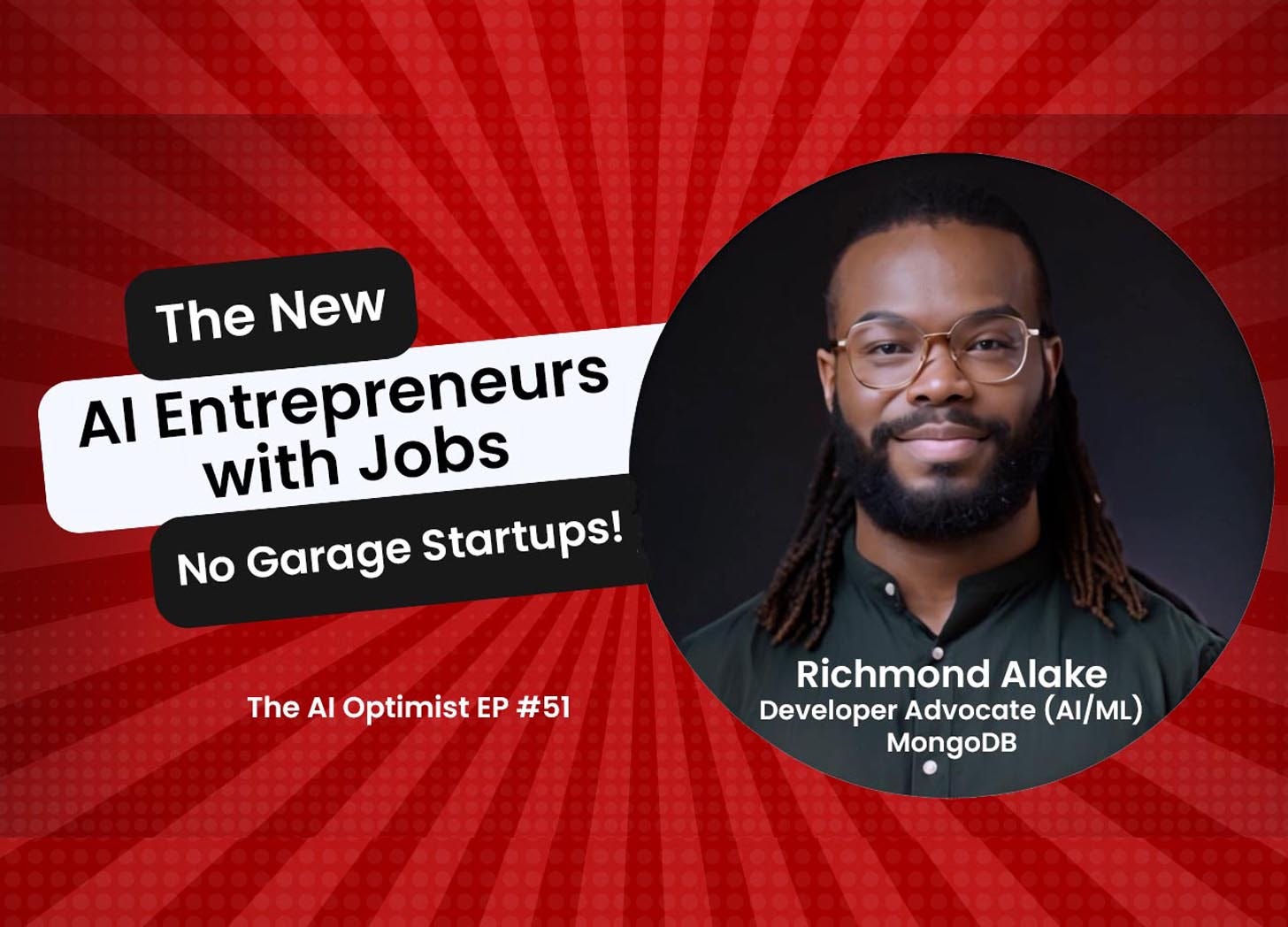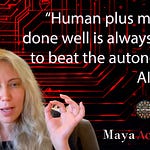Since the early days of the Internet (and long before), the romantic image of the entrepreneur as a visionary individual, working in a garage, fueled by passion and top ramen.
These change the world kind of characters are easy to remember, from Steve Jobs to Google’s Larry Page and Sergey Brin, to Mark Zuckerberg working out of his dorm to invent Facebook.
Get a few people together, break some rules, and create things no one could dream of, because dreaming isn’t allowed when you have a job working in a big company.
Now that narrative is changing with AI, as huge companies bring in entrepreneur mindsets and methods to disrupt slow-moving goliaths bent on supporting the status quo.
What if the next AI wave of groundbreaking ideas isn't coming from standalone startups, but from big tech giants and established companies?
Meet Richmond Alake, Developer Advocate (AI/ML at MongoDB, challenging our preconceptions about what it means to be an entrepreneur in today's digital world.
His DIY AI Agent Roadmap, Episode 48, shows how he applies this approach to his daily work.
Join us on a journey through the entrepreneurial zeal of MongoDB, showing the spirit of entrepreneurship thriving in a large organization. Richmond is in a group of innovators combining the resources and stability of big tech with the agility and passion of startups.
During our conversation, he shares the cultural shifts happening in MongoDB, where failure is a learning opportunity, experimentation is the norm, and the lines between 'employee' and 'entrepreneur' are increasingly blurred.
Richmond shares personal insights on keeping startup energy in a corporate setting, the importance of customer obsession, and the power of pivoting in response to rapid technological changes.
The New Face of AI Entrepreneurship: The Entrepreneurial Culture at MongoDB
Our journey begins with understanding the unique culture at MongoDB that nurtures entrepreneurship. When asked about the enterprising spirit within the company, Richmond paints a vivid picture:
"MongoDB is a company that generally harbors a lot of individuals with that entrepreneurial spirit. And there are several reasons for that.
One, most of our customers are really building things at the edge or at the cutting edge of technology.
And to be able to experiment and discover ways to provide value using the latest technology requires some form of entrepreneurial characteristics."
This spirit isn't limited to a single department, it fills the entire organization:
"That's why you see most people that are within MongoDB are very passionate about whatever they doing.
It might be AI, it might be pure database, it might be sales or communication.
But there is something that is present for all individuals I've come across at MongoDB, and that is they are very passionate about being in the company and passionate about the things that they do within the company."
Being an entrepreneur doesn’t mean Quitting Your Job
One of the most refreshing parts of Richmond's perspective is his challenge to the common belief that entrepreneurship requires leaving your day job:
"There is this common rhetoric that you have to quit your job, your 9 to 5, to be successful as an entrepreneur.
That is not true anymore. And within MongoDB, it's even less true, because one thing you have to notice is your career can go hand in hand with your entrepreneurial journey."
Working at MongoDB enhances his entrepreneurial skills:
"Essentially within MongoDB, what I've learned is to be obsessed.
And I mean overly obsessed about people that are using your product.
MongoDB has taught me to think about who is on the receiving end and how they're feeling, what they're thinking about when they're consuming your content or using your product."
Now obsession is often considered a negative trait, or one practiced best in isolation.
Being client-driven is a cliché these days, still being part of a group who each day listen, interact, and learn from customers is a model worth emulating.

How Management Instills Entrepreneurism into the Culture and Management
The hierarchy of corporations often pushes the independent spirit of an entrepreneur out the door, but MongoDB’s management flattens the curve.
When hiring they encourage the entrepreneur spirit in those applying, seeing if they have that self-directing approach to be starting and communicating honestly during the process.
It’s not enough to try something out, and if it works you own it. That’s encouraged. Richmond remembers a smaller startup where this didn’t happen:
” I’ve worked in startups where we've had just 12 people in a team right.
And we're all on the same floor but I am not allowed to speak directly to the CEO.
Now I'm in MongoDB, a company with several thousands of employees. And I can talk to the CEO, and he responds to questions within 30 minutes
So, in MongoDB you are allowed to be entrepreneurial Everyone is allowed to take ownership And MongoDB still has a startup spirit.”
Balancing Forward-Thinking and Urgency in AI
In the rapidly evolving field of AI, staying ahead of the curve is essential.
Richmond shares his approach to this challenge:
"Now, one important skill is to be able to be both forward-thinking and also be experimental and be urgent and move with urgency, basically.
So, AI moves at the speed of innovation. There are models being released every single week, embedded models or large language models or tools.
It's my job to be able to understand where the field is going at least six months in advance."
He gives a concrete example of how this forward-thinking approach translates into action:
"Very early on this year, we were able to notice that agents are becoming more reliable and more predictable, and more people are building them and learning about them.
So, we started to put a strategy together to help understand how MongoDB fits into agents, then how MongoDB can empower our customers or developers to learn and use these Agentic Systems that will be coming up later on this year."
He also shares videos, documents, and GitHub code for the AI Agents:
GENAI Build Repository (Github) - Code related to this podcast
https://github.com/mongodb-developer/GenAI-ShowcaseMongoDB For Startups, with a strong developer community.
His role revolves around enabling developers with knowledge and tools. It focuses on the processes and steps towards an emerging frontier: AI agents.
Being immersed in the customer experience, they integrate the community of developers and businesses as a way of keeping ahead of the learning curve demanded by AI.
While others focused on prompting, their customers showed them the importance of agents by requesting and designing them. Following the customers’ demand is commonly pitched though rarely practiced.
Instead of just reading 3rd party research and viewpoints, learning directly from customers gives them insights they couldn’t get being separate from their audience.
By being part of the developer community and providing resources from coding to go to market strategies, the intelligence of the business grows with input from the most important stakeholders, the customer.
The Freedom to Fail and Learn
One of the key aspects of entrepreneurship is the ability to take risks and learn from failures. Richmond explains how MongoDB embraces this mindset:
"You have to move fast. You have to be able to learn very quickly.
You have to be able to fail. And you're allowed to fail, which is the most important thing. The key thing is learning from those failures and using your learnings to inform your next action.
And there is a lot of experimentation, I'll tell you, but you're allowed to have fun as well."
Failure can be one of the most destructive elements of a business. Sometimes employees are almost incentivized to hide the truth, to not reveal failure because it hurts their careers.
Often management will take a judgmental and even antagonistic approach, pitting employees against each other with the illusion of perfection.
MongoDB embraces failure as part of the normal business day. But you must learn from these failures and adapt, and there is no penalty for failing.
That spirit of experimentation is rare in large companies, even startups, but in flattening the management style so it collaborates with employees, failure is understood as part of the learning process leading to excellence.
Trust and Intellectual Honesty in AI
The enterprising spirit at MongoDB is built on a foundation of trust and intellectual honesty. Richmond elaborates:
"MongoDB, there is a lot of trust. We're taught to be intellectually honest.
That's one of the key values. And with that trust comes a responsibility.
Essentially, admit when you're wrong or when you might have taken a wrong turn, but being able to apply the learnings into your next turn."
The Power of Pivoting
One of the startup secrets is, your first business idea is rarely the right one. Google began doing searches within larger organizations.
Then it found a competitor do cost per click, CPC, advertising. They bought their own CPC company and to this day the legendary revenue of Google is driven by this CPC.
Airbnb began by renting rooms with air mattresses, until moving into full house and apartment temporary rentals. Pinterest began as a shopping cart and removed the ecommerce part and focused on the pictures.
Still pivoting once or twice is ok; more than that shows the business doesn’t know where it’s going.
Entrepreneurs know the importance of pivoting when necessary. Richmond shares how this concept is applied within MongoDB:
"Pivot is essentially the way I apply it to my role. If we look at maybe the last quarter, I've tried two different strategies in terms of winning over our customers or reaching our customers, who are developers.
Some may work, some might not have worked. And I looked at the ones that have worked, and I look at the key learnings from that.
But at the same time, we look at the ones that haven't worked and look at how we can pivot into something that can work."
Breaking Down Company Silos
One of the unspoken challenges of bigger companies is how different divisions compete against each other. Often, they are not encouraged to work together, creating competition instead of collaborating.
A common challenge in large organizations is the existence of silos. Richmond explains how MongoDB tackles this issue:
"The way we're able to break down the silos is by having an overarching aim objective that is communicated at every aspect of the organization, from leadership to the most junior member of any team. And we love to communicate with each other."
Disruption from Within
Prior to AI, many startups disrupted entire industries by being small and lean. Think of Uber creating an app to dominate the taxi business with private contractors as drivers. PayPal disrupted the payments industry.
Napster turned music into licensing by being sued into submission, leading to the rise of Spotify and the current business models which decimated the traditional music industry players.
When it comes to disruption in the tech industry, Richmond explains how MongoDB plays a crucial role:
"We disrupt by enabling our customers to disrupt. We worked very closely with a number of startups.
So, disruption does still happen from the bottom up, as we can see with companies that are in the AI space."
He goes on to describe MongoDB's commitment to fostering innovation:
"MongoDB works a lot with startups. We empower them. We enable startups.
We have a MongoDB startup program where we give free credits and expert advice, and we allow startups to speak to MongoDB experts and actually even put them in front of some go-to-market strategies for the startup."
The New Entrepreneurial Frontier
The landscape of entrepreneurship is evolving. The gulf between "startup" and "corporate" is blurring, giving rise to a new breed of innovators who combine the best of both worlds.
For those working in larger companies, Richmond's story is one of smart management being approachable and encouraging a culture of creativity and experimentation. Looking for employees who lead by example, they’ve created a team of entrepreneurs working together like an accelerator of internal projects.
The ambitious spirit thrives within larger organizations, if there's a culture that values innovation, experimentation, and intellectual honesty.
The key learnings for aspiring entrepreneurs in big tech are:
1. Embrace the resources and stability of your company while keeping the agility and passion of a startup.
2. Don't be afraid to fail – use each experience as a learning opportunity.
3. Stay ahead of the curve by listening to your customers while thinking months in advance, especially in fast-moving fields like AI.
4. Communicate openly across all levels of the organization.
5. Be customer-obsessed and always think about the end-user of your product or service.
The new face of entrepreneurship isn't about where you work, but how you approach your work.
It's about bringing that startup energy, that willingness to experiment and pivot, and that deep passion for innovation into whatever environment you're in.
Whether you're in a garage or a corporate office, remember: the entrepreneurial spirit knows no bounds. Embrace it, nurture it, and who knows?
You might just be at the forefront of the next big disruption in tech.
Upskilling in AI often focuses on practical skills, now the soft skill of being an entrepreneur, taking the mindset to experiment and be willing to fail, and own it, is central to success.


















